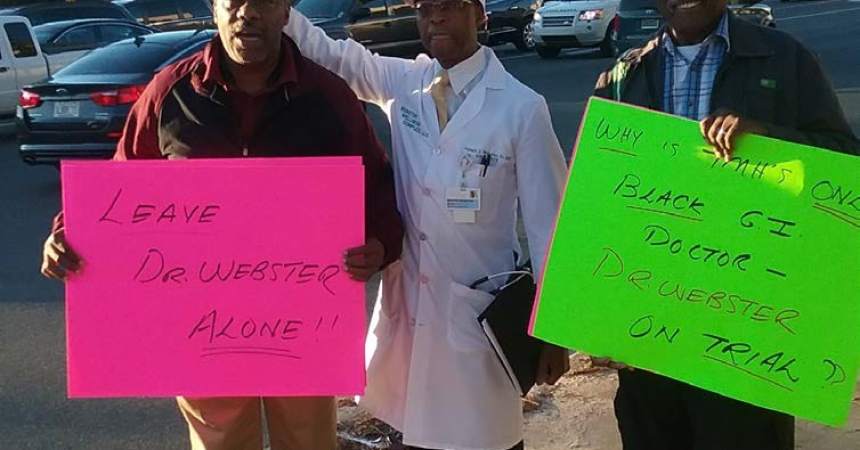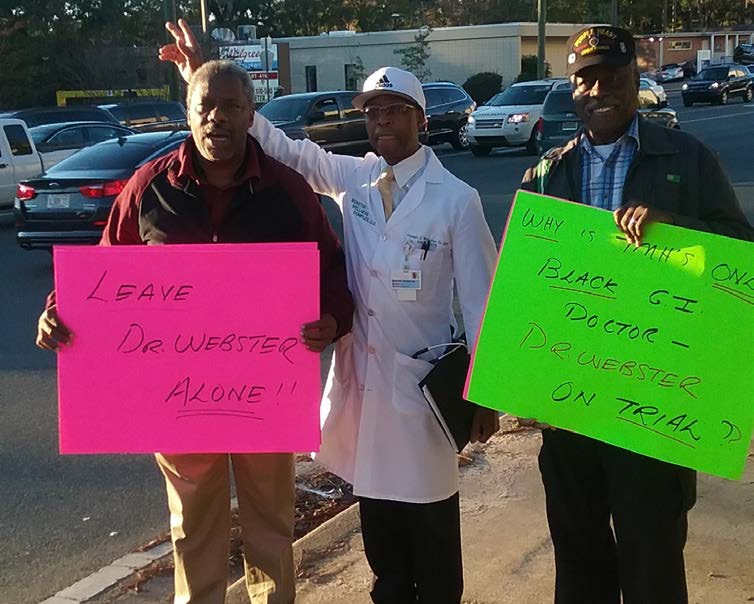
Supporters wait, Webster’s case goes to appeal

Supporters surround Dr. Joseph Webster during a recent protest outside of TMH. Photo by St. Clair Murraine
[subtitle] ‘There is some cherry picking where certain patients go in one direction and patients that have limited or no resources go in another direction. Many of us have experienced that.’
–Dr. Cyneetha Strong, president of the William J. Gunn Medical Society
[/subtitle]
St. Clair Murraine
Outlook staff writer
Longtime Tallahassee gastroenterologist Dr. Joseph Webster has turned his case against Tallahassee Memorial Hospital over to his South Florida attorney to handle the appeal phase.
While he didn’t say much about the process, Webster confirmed that the Judiciary Review Council voted to support the recommendation of TMH’s medical executive committee, which calls for removal of his privileges at TMH and revocation of his licenses.
Webster also reiterated that he’ll continue “until we get justice.” The appeal process should take 14 days, Webster said, without giving specific dates.
Since the issue became public in recent weeks, TMH administrators have been mum on the case, citing that it’s personnel policies prevents them from naming the person involved in the dispute.
Meanwhile, a cross-section of doctors and Leon County commissioner Bill Proctor have stepped up to show support for Webster.
The dispute between Webster and TMH has been ongoing since 2013 when he expressed his concern over being omitted from a list of gastroenterologists on emergency room calls. It reached boiling point recently when protesters marched in front of the hospital to show their support of Webster just days after he had a hearing with TMH’s administrators.
Webster contends that he has gotten six calls during the 30 years that he’s been with TMH, with most of those being for patients who couldn’t afford the cost. He also said that racism is at the core of the hospital’s action.
What Webster is experiencing has long been a trend for Black doctors, said Dr. Esaias Lee, a family medicine physician in the area for more than 30 years.
It’s unfortunate that Webster’s case has become a “Black vs. White, us vs. them” scenario, said Dr. Cyneetha Strong, president of the William J. Gunn Medical Society, a local affiliate of the National Medical Association.Strong said the situation presents a conundrum for her as president of an organization with a diverse membership, saying that the case could be a good starting point for a conversation about the roles that Black doctors could play with large health providers such as TMH.
“There’s certainly a David and Goliath issue; small independent practitioners vs. big groups, hospital vs. private,” she said. “There are racial things; inequities that still occur. There is some cherry picking where certain patients go in one direction and all the patients that have limited or no resources go in another direction. Many of us have experienced that.”
However, Lee, a staunch supporter of Webster, said there are a handful of Black physicians who are being paid well, while others have to take low-income patients.
For example, Lee said, early in his career he was paid just over $330 for delivery of a baby and year-round care of a mother and child, while White doctors were making at least $2,700 for the same service.
“It’s really tough for Black doctors, period,” Lee said. “We are in trouble. The community is in trouble.”
Leon County Commissioner Bill Proctor echoed Lee’s sentiments, saying that he was especially concerned about his District 1 constituents and how TMH’s ouster of Webster could affect patients from his district. He questioned TMH’s willingness to serve Black patients and whether the hospital was meeting its requirements for being funded by taxpayers.
“When you don’t accept my doctor, you aren’t accepting me in the hospital,” Proctor said. “When you threw Webster out, you threw me out. There is no way you could separate his denial (of privileges) and not simultaneously deny all of us who go to him.
“They’ve used him, abused him and now they are going to throwing him away like a disposable diaper. But the worst part is that in treating him like a disposable diaper, they threw him out of the hospital and he can’t come now to see me.”
Proctor said he has to support Webster, not only for his stance against the hospital’s practices, but because Webster has long been championing the cause of poor people.
“I represent them and he is my doctor,” Proctor said. “Plus, they are tax payers who support TMH. The people are trying to tell TMH that they want Dr. Webster, then they should listen.”








